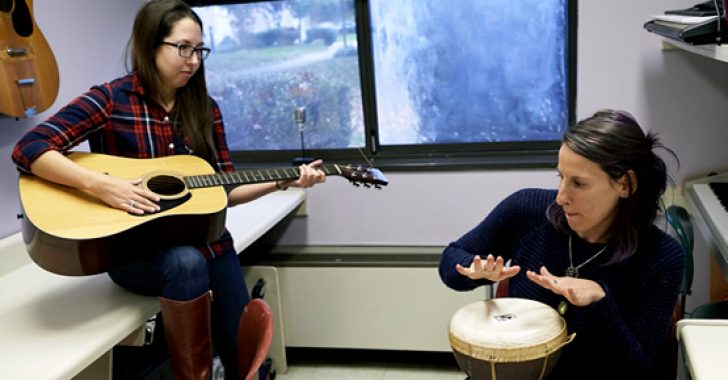Banding Together: Music Performance Ensemble at Eagleville Hospital
It’s been long understood that humans respond deeply to music. Hearing a song can reach primitive areas of the human brain that aren’t accessible through words alone and even impact our motor and nervous systems.
It should come as no surprise that the same is true of music we make ourselves with our instruments, our hands, our voices. Performing music in treatment is less common than using pre-recorded music, but it’s believed to offer similar benefits for individuals facing mental health and substance use disorders. For instance, playing an instrument or singing can decrease stress and anxiety and improve self-image, self-esteem, and self-expression.
That’s why Eagleville Hospital offers a weekly Music Performance Ensemble, separate from its popular Music Appreciation program. “About two years ago, one of our adjunctive therapy assistants, Mike Panzeter, proposed the Music Performance Ensemble, and Eagleville supported it,” explains Lara Haagen, Eagleville Hospital’s Adjunctive Therapies Clinical Coordinator. “He’s a performing musician himself, so this was really a passion for him. Eagleville purchased and received donations of electric and acoustic guitars, a bass, a couple of keyboards, various types of drums, a ukulele, even a mandolin. Patients are excited to find that their primary instrument is available.”
Those who join Performance Ensemble are often excited and surprised to find they have the tools and support needed to get back into music. They practice together once a week and can work together for as long as they’re in recovery at Eagleville.
“Some of our patients stopped playing or performing amid active addiction, so the Performance Ensemble reawakens something they had lost,” Panzeter says. “Other patient musicians rarely practiced or performed sober. Remembering that they can be emotional and creative and technically proficient while sober is empowering.”
Panzeter notes that group cohesion is crucial to a band’s success.
“In a group that’s working well, the patients will support each other and help each other improve,” Panzeter says. “Some patients will tell me that at first they may not be sure if they wanted to stick with it, but they appreciated having something to work toward and connect with. Being part of a group with a common goal helps them believe in their own recovery and their time at Eagleville.”
Prior to a performance, Panzeter will step up their practices to at least three days a week. When they’re ready, the group performs a concert in front of fellow patients in the Price Building gymnasium.
Common selections include Jeff Buckley’s rendition of “Hallelujah,” Johnny Cash’s version of “Hurt,” Leonard Skynard’s “Simple Man,” “Nutshell” by Alice In Chains, and “Wagon Wheel” as performed by Darius Rucker.
Not surprisingly, it’s a treat for patients, performers, and staff who are able to attend.
“A lot of times, the audience will sing along,” Haagen says. “The songs are usually oriented to recovery, so we’ll see patients crying, hugging each other, even dancing together. During one of the last performances we had, the ensemble played “Lean On Me” and everyone in the audience was standing with their arms around each other.”
Though it’s often nerve-wracking for the performers, taking center stage offers a hidden bonus. They learn to positively cope with stress and sometimes realize that what they had mistaken for anxiety is something else entirely.
“Before a recent performance, our Wellness Specialist led a meditation with the band before they performed,” Haagen says. “There can be a lot of anxiety before and during a performance, but it’s a healthy stressor. Sometimes anxiety and excitement feel the same to our bodies, so we have to learn to recognize and manage those feelings.”
For many patients, music performance remains a treasured hobby after discharge. Occasionally, a group will stay in touch or return and perform an alumni show. In other cases, alumni go on to work full-time in sound production or continue to play music on the side with a band.
“Having the opportunity to play together””to be in a group setting where there’s give and take””requires hard work, positivity, and humility,” Panzeter says. “Those traits are essential to recovery, too. So when we see patients develop these skills, we’re not just excited for their future performances””we’re excited for their health and sobriety.”

